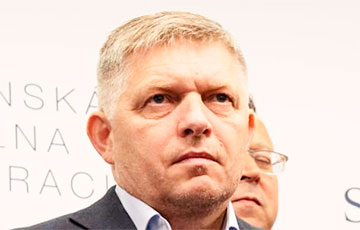'Fico Was Just Scared'
11- 23.01.2025, 17:46
- 28,720

Will the Slovak opposition manage to remove the pro-Russian prime minister?
On January 21, at the initiative of the opposition, a vote of no confidence in the government of Robert Fico was to be held in the National Council (unicameral parliament) of Slovakia. However, he vote failed: the meeting turned into a closed one due to the fact that the head of government presented a secret report at it, and the opposition deputies left the parliament.
Will the Slovak opposition manage to remove the pro-Russian prime minister? Charter97.org spoke about this with Grigorij Mesežnikov, a Slovak political scientist and the President of the Institute for Public Affairs (IVO Bratislava).
— I would clarify a little, the first attempt did not fail. The fact is that Robert Fico and the government coalition simply resorted to manipulation. For the first time in the history of Slovak parliamentarism, in absolute contradiction with the document that defines the procedures in the Slovak parliament, they made this session non-public. Allegedly, Fico had to read out some summaries of the secret service there, allegedly there were secret places, so it was necessary to make this meeting non-public.
The opposition, in fact, boycotted this meeting, that is, the attempt to express no confidence in the Prime Minister failed. It, of course, would have failed in any case, even if the meeting had been held normally, because the opposition now does not have a majority in parliament. Opposition politicians understand that it is unrealistic to express distrust while having a minority. But in fact, the goal of the opposition was to make, as they say, public all those arguments that, in their opinion, are sufficient for this government to resign.
In Slovakia, the government resigns if a vote of no confidence in the Prime Minister is expressed. Therefore, the opposition planned a long session with speeches by many MPs. They prepared, and Fico was just scared. The fact is that its popularity is now falling. Opinion polls show that almost two-thirds of the population disagree with his policies. According to the latest survey, 63% of the population do not support Fico's policies, only 28% support him. The rating of government parties is falling, and the popularity of the opposition is now on the contrary increasing.
So Fico decided to manipulate. He, in fact, violated all local norms of parliamentarism, so this session ended in this way, the opposition simply left the meeting room.
In Slovakia, there has never been such a thing as expressing no confidence in the government. In 2011, there was a similar story when the government of Iveta Radičová was indeed forced to resign, but then it was a vote of confidence in the government, this is a slightly different procedure. There was a vote related to the support of the so-called European System of Financial Supervision (ESFS), [in force since 2011 - Ed.] during the financial crisis. One of the parties of the ruling coalition did not support this bailout, so the government was not trusted.
Indeed, due to a vote of no confidence, starting in 1990, the Slovak government did not resign. It is theoretically possible, but practically not. But the opposition will try to raise this issue again. And the interest was, of course, huge for this session, because now we have rallies in the country. There will be another round of these protests on Friday.
So, yeah, things got complicated. It has become more complicated due to the fact that Fico now adheres to narratives that are very similar to the approaches of Putin and Lukashenka. He talks about possible coups, mentions Maidan, but in a negative sense. That is, he, in fact, positions himself as Yanukovych. For him, the Maidan is something unacceptable.
We know that the Maidan was an action aimed at expanding freedom in Ukraine. In 2004, the Orange Revolution took place, in 2013, it was also a struggle for freedom in conditions when the authoritarian regime does not allow civil society and the opposition to engage in public activities.
However, in fact, there is still a democracy in Slovakia. So far, Fico has not become either Yanukovych or Lukashenka, and I hope that even if he wanted to, it will be difficult for him to do it. However, he is intimidating. Intimidates the opposition and civil activists, threatening that the government is ready for any developments. I do not know what it is ready for now, but Slovakia, I think, is now ahead of neighbouring Hungary on many issues, including in relation to Russia.
— Why do you think so?
— Orban, of course, is also a pro-Russian politician, but he went to Kyiv at least. He doesn't insult Zelensky the way Fico does. Fico used personal insults. After his visit to Putin and the meeting of a group of MPs from his Smer party and from the Slovak National Party with representatives of the State Duma and the Federation Council, Fico and his local allies began to talk about the possibility of Slovakia's withdrawal from the European Union.
Fico, of course, is closer in spirit to Putin, I do not know how he treats Lukashenka, but I would not rule out that he may begin to flirt with Lukashenka. So far, this has not been observed here, but I have not heard any criticism of the Belarusian regime, which is totalitarian, from representatives of the current ruling coalition. Never.
They generally believe that interference in the affairs of sovereign countries is unacceptable. Although, in general, the European Union is built on the principles of cooperation and compliance with European rules. If someone does not comply with these standards, then European institutions, of course, react. In particular, Slovakia was criticized by both the European Commission and the European Parliament for internal political problems.
Fico's line is that he occupies an allegedly sovereign position: no one can criticize us, and therefore we will not criticize anyone either. This also applies to the situation in Georgia. Slovakia and Hungary did not support the imposition of sanctions against those representatives of the current Georgian political establishment who are responsible for election-related events.
I don't think Fico wins yet. What was in these classified papers? Apparently, they hacked into the correspondence of some civic associations and found this information.
Interestingly, there was a document written using ChatGPT. It was just an NGO action plan: what to do, what slogans to use at peaceful demonstrations. At the same time, it was constantly emphasized that these were peaceful demonstrations. Slogans, ways of expressing them, routes for marches, etc. were indicated. Absolutely nothing illegal was there. Furthermore, the mailing was sent to 120 recipients, making the intended audience clear.
Fico is really afraid now that his popularity will start to fall. He was afraid that the opposition would talk about his political steps for a long time and in detail, giving some examples. And in this regard, the opposition is much better prepared rhetorically, they have good opposition speakers, with whom Fico can not even compare.
Therefore, he decided to classify this session, violating all procedural rules. He succeeded, but I think that he will not be able to shut the mouth of the opposition. The opposition will have other platforms.
— If Fico resigns, will this be only local in nature, or will this event affect regional policy as well. In Hungary, for example, parliamentary elections will be held next year. Can Slovakia reverse the populist trend in Europe?
— Absolutely, of course. I'll say this: he, of course, won't be resigned, it's simply impossible now. But if suddenly, theoretically, he ceases to be prime minister as a result of elections or some pressure from the street, this, of course, will change the overall political landscape in Slovakia and domestic politics.
This has already happened in 2018. But then, again, this happened after the murder of Jan Kuciak (due to the high-profile murder of a Slovak investigative journalist, President Andrej Kiska allowed the possibility of holding early elections in the country — ed.), and the situation was somewhat different.
If Fico ceases to be Prime Minister tomorrow, purely theoretically, who can replace him? Only his opponents, only liberal-democratic parties. If they come to power, they will be pro-Western, pro-European, pro-Atlantic and pro-Ukrainian, pro-democratic.
It is clear that his resignation from power will automatically mean a radical change in everything: both regional policy and Visegrad cooperation, which, of course, will at least be updated with Poland and the Czech Republic. Perhaps there will be problems with Hungary, with which, unfortunately, Fico is now creating a tandem with Orban. Of course, everything will change.
But this is the same as, probably, in Belarus. Imagine that tomorrow Lukashenka will cease to be a leader — who will come to power? It is assumed that these will be representatives of the democratic spectrum, and not its followers. We may have a different situation here: his followers are his personal supporters, and if he loses the election, they will leave with them. In Belarus, of course, the situation is still different, and the change of power there will be more difficult.
But in any case, it will change the situation. The same is true of Putin in Moscow: if he suddenly leaves, something will still change. And in Slovakia, absolutely everything will change, absolutely.











